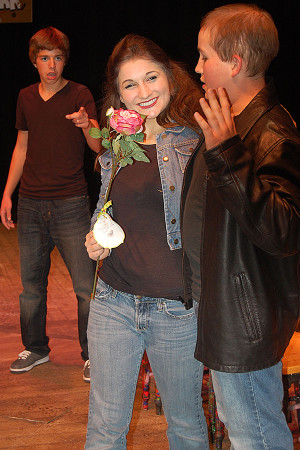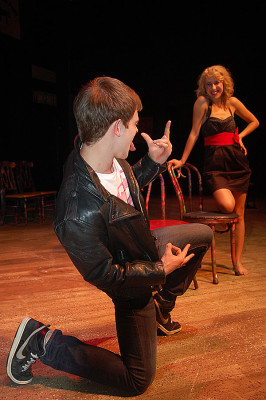Dealing with the small parts
How actors at BVSW approach roles other than the leads
Johnny Tapp as “Bruce” rocks out, trying to impress Lauren Henke as “Rosie”.
When the cast list goes up, there are always a couple people who are absolutely ecstatic. Right at the very top of the page lie their names, directly adjacent to the title characters. Their hard work has paid off. They got the leads. But for the majority of auditioners, the cast list only brings disappointment. His or her name lies near the bottom of the page: chorus member 3.
Many students, especially in upcoming Blue Valley Southwest productions “Boardwalk Dreams” and “Hamlet”, have to decide how to approach these smaller roles.
But there is a light at the end of the tunnel.
“It sounds cliche, but I think that each character in every play is a vital part of the story, no matter how big or small,” senior Tori Loepp said. “The actor just has to do the work to make their character one that is memorable to the audience.”
Southwest theater director Dan Schmidt further explained this concept.
“Treat the role as if it’s a lead, like the show is about you,” Schmidt said. “If you do that, you won’t go wrong.”
Schmidt shared his collegiate acting experience at the American College Theatre Festival. Spanning over five to six states, it was a tougher version of the high school level State Thespian Conference. More information can be found at http://www.kennedy-center.org/education/actf/regions.html
For each show, judges would nominate two actors from the show to compete later on; 50-60 percent of the time it would be a lead and a much smaller role.
“You had to stand out and be unique,” Schmidt said. “Some nominees didn’t even have a line, but they made the show memorable.”
One of Southwest’s own learned this lesson when the 2012 Blue Star nominations came out. Judges from the program attend the musicals of various high schools and nominate certain aspects of a show — a leading actress, costume design, etc. — for perusal by the Starlight competition.
In this case, then sophomore Lauren Henke was nominated for Best Featured Role in a Musical.
“I was quite surprised at my nomination – I wasn’t even aware there was a category for best featured actress,” Henke said, now a senior.
Henke was a dancer in the show, appearing on stage from time to time as a party-goer, nightclub dancer, dog and a dancing portrait. None of these roles where by any means huge, but she managed to make them stick out to the judges.
“I’d like to think they gave it to me because I truly just made the best of my role,” Henke said.
And that’s exactly what actors have to do.
“In ‘Hamlet’, I have a little bit of a harder role to play, for me,” Loepp said. “It is hard to make Voltemand memorable because I come on stage for a very short time and my character is more serious.”
But since the majority of actors have these types of roles, especially starting out, it is important to know how to handle them.
“Its important to make your role stand out because directors will notice you,” Loepp said. “If you have a memorable small role, it might make the director think about trusting you with a larger role.”
Schmidt agrees.
“It’s huge. Absolutely huge,” Schmidt said. “It’s the difference between a college production and a semi-professional one. A high school show and a college show.”

Not only will the director notice these actors, but the audience will too.
“I can appreciate those who don’t have leads but try to make the show the best it can be,” junior Cameron Long said.
Long has seen two shows at Blue Valley Southwest — 2011’s “The Laramie Project” and 2013’s “The 25th Annual Putnam County Spelling Bee”. He recounts watching characters other than the leads in the latter.
“Hunter in Spelling Bee might not have been one of the finalist characters, but his enthusiasm added to the overall product,” Long said.
Schmidt anticipated this response exactly.
“You expect leads to be good because every schoo
l has some talent,” said Schmidt. “But when everyone is it’s ‘wow, what a great show!’”
Finding ways to entertain the audience no matter the role may be difficult, but according to Loepp:
“That’s the cool thing about theatre. You get to play, and make believe and imagine!”
[slideshow id=111]







